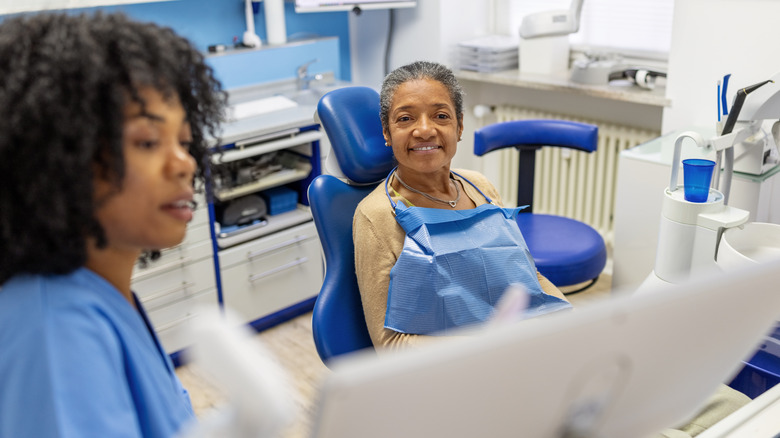Are Teeth Connected To The Health Of Your Organs? Here's The Truth
As much as it's important to stay on top of your brushing and flossing for the sake of your oral hygiene, it's also essential for the health of the rest of your body, too. In fact, your teeth and body are more connected than you might think. Research continues to show that what happens in your mouth doesn't stay there—it can impact multiple organs throughout your system.
According to a 2023 study published by the American Heart Association, a healthy mouth plays a critical role in maintaining brain health, while gum disease and plaque buildup can significantly raise your risk of stroke. "Our study expands existing evidence showing the adverse effects of oral health on cardiovascular health by extending it to brain health," study author Dr. Cyprien Rivier told Healthline. "The core message," he said, "is that we need to be extra careful with our oral hygiene because it has implications far beyond the mouth."
The Mayo Clinic also notes that gum disease and oral bacteria may contribute to pneumonia and pregnancy complications. But that's just the beginning of how much your teeth and organs are so fiercely connected. Your mouth, it turns out, is one of the most important gateways to your overall health.
What else your teeth are trying to tell you
Staying healthy, from head to toe, means being aware of what's going on in your entire body. So if something is off in your mouth, you don't want to ignore it. As much as gum disease and plaque buildup can cause medical issues, other things that may have never crossed your mind as being problematic can also be indicative of serious problems. For example, if you're too old to suddenly have a loose tooth, that's concerning because it could mean you have heart disease and are unaware of it, or osteoporosis isn't far away (per Mosaic Dental). While in many cases, loose teeth are a symptom of gum disease, that's not always the case, so it's worth having it checked out.
Beyond your teeth, your breath can also be a dead giveaway of a serious medical issue. Although most bad breath can be fought with regular brushing and flossing, if you can't shake it and it smells eerily of ammonia, then it could be kidney disease, according to South Gables Dental. Or, if halitosis persists, but it doesn't have a chemical-like smell to it, it could be a sign of certain cancers.
Because the link between your teeth and overall health is real, it's up to you to make sure you stay on top of your oral health care. That doesn't mean just brushing regularly, but, for some, making lifestyle changes too.
How to keep your teeth and gums healthy
If you're brushing at least twice a day, then you're off to a good start, but that's just the beginning. Flossing at least once a day and brushing your tongue every time you brush your teeth is important, too. You also want to get a new toothbrush every three to four months, or sooner if your brush looks like it's seen some stuff and needs to be put out of its misery.
Because good oral hygiene is also about lifestyle choices, you want to avoid or at least try to limit the amount of sugar you consume. As tasty as sweets might be, they're wreaking havoc on your teeth. Also, you need to ditch the tobacco and take into consideration what medical issues you already know you have. (Is a "quit smoking" program right for you?) "Environmental factors such as smoking and health conditions such as diabetes are much stronger risk factors for poor oral health than any genetic marker — except for rare genetic conditions associated with poor oral health, such as defective or missing enamel," stroke expert and neurologist Joseph P. Broderick, M.D. told the American Heart Association.
But diabetes isn't the only medical condition that can negatively affect oral health. So can HIV/AIDS, certain cancers, and Alzheimer's disease (per Mayo Clinic). If you have any of these, it's important to be even more diligent about taking care of your teeth and not let anything go.
Lastly, everyone should be going to the dentist at least once a year for a checkup because a professional's eye can bring something to the equation that you just can't.


